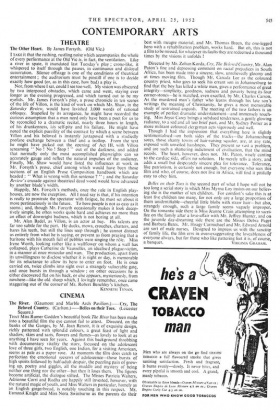CONTEMPORARY ARTS
THEATRE
The Other Heart. By James Forsyth. (Old Vic.)
I TAKE it that the rushing, rustling noise which accompanies the whole of every performance at the Old Vic is, in fact, the ventilation. Like a river in spate, it inundated last Tuesday's play ; crone-like, it whispered to itself through the pauses, in continuous and disloyal susurration. Silence offstage is one of the conditions of theatrical entertainment ; the auditorium must be pinstill if one is to decide exactly how good (or, as in this case, how bad) a play is.
Nor, from where I sat, could I see too well. My vision was obscured by two interposed obstacles, which came and went, staying ever longer as the evening progressed, and which turned out to be my eyelids. Mr. James Forsyth's play, a prose chronicle in ten scenes of the life of Villon, is the kind of work on which Mr. Shaw, in the
Saturday Review, would have lavished 3,000 words of rational
obloquy. Stupefied by its arrogance, he might have recorded the curious assumption that a man need only have been a poet for us to be reconciled to a dramatic recital, nearly three hours in length, of his drunkenness, his self-pity and his failure. He might have noted the explicit puerility of the contrast by which a scene between Villon and his beloved is instantly juxtaposed with a studiedly profane exchange between a thief and a trollop. From the text he might have picked out the opening of Act III, with Villon screaming " No ! No ! Stop ! " out of the darkness, and added that normally only the most accomplished playwrights can so accurately gauge and reflect the natural impulses of the audience.
Finally, Mr. Shaw would have listed the influences at work in Mr. Forsyth's prose, chief among which would have been those sections of an English Prose Composition handbook which are
headed : " What is wrong with this sentence ? " ; and the Saturday Review's crusade against theatrical dead wood would have advanced by another blade's width.
Happily, Mr. Forsyth's methods, once the rule in English play- houses, are now the exception. All 1 need say is that, if his intention is really to prostrate the spectator with fatigue, he must set about it more pertinaciously in the future. To bore people is not as easy as it seems ; and, though Mr. Forsyth occasionally makes it look decep- tively simple, he often works quite hard and achieves no more than an effect of downright badness, which is not boring at all.
Mr. Alan Badel, as Villon, is an actor at bay. His talents are far too subtle for the part. He ducks, mows, crouches, chatters, and bares his teeth, but still the lines seep through ; he cannot distract us entirely from what he is saying, or prevent us from praying that a baritone with his mouth full of pebbles were singing the role. Miss Irene Worth, looking rather like a wallflower on whom a wall' has collapsed, plays Catherine de Vausselles, an idealised plague-victim, in a manner at once muscular and wan. The production, apart from its unwillingness to disclose whether it is night or day, is memorable for its reluctance to allow its hero to enter on foot. He is once carried on, twice climbs into sight over a strangely vulnerable gate, and once bursts in through a window ; on other occasions he is either discovered flat on his back, or else appears, mysteriously, from nowhere—like the old sheep which, I lovingly remember, once came staggering out of the corner of Mr. Robert Benchley's kitchen.
KENNETH TYNAN.


































 Previous page
Previous page